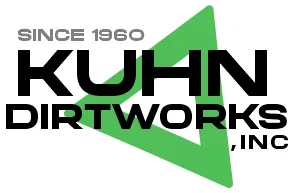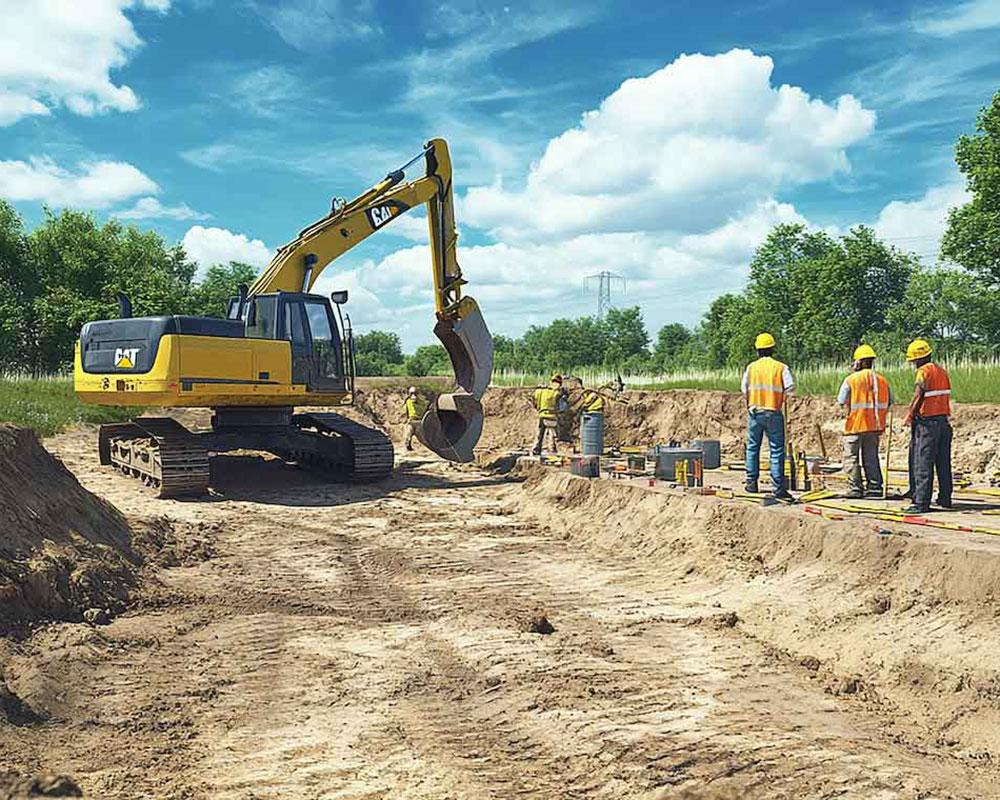
Serving IL & IN: Clark, Vigo, Edgar, Crawford, Sullivan, Clinton, Coles & Greene Counties
Blog

Budgeting for Commercial Excavation Near Charleston, Coles County: How to Keep Costs Under Control
1. Introduction: The True Cost of Commercial Excavation (And Why It’s Hard to Predict)
You know you need excavation work done, but there’s one nagging concern in the back of your mind: How much is this going to cost me?
If you’re a business owner or developer in Charleston, Coles County, you’ve probably heard horror stories about excavation budgets getting out of hand—hidden fees, unexpected problems, and bills that balloon way past the original estimate. Maybe you’ve even experienced it yourself.
The reality is, excavation isn’t just about moving dirt. It’s about preparing the foundation for everything that comes next, and if something goes wrong in the process, the costs can quickly spiral.
At Kuhn Dirtworks, Inc., we’ve seen firsthand what happens when commercial projects aren’t planned properly. That’s why we’re here—to give you the inside scoop on how to budget for excavation the right way and avoid the costly mistakes that trip up so many business owners.
2. What Drives Excavation Costs in Charleston, Coles County?
Before you can budget effectively, you need to understand what actually affects excavation pricing. It’s not just about how much dirt needs to be moved—there are several key factors at play:
1. Site Conditions
The type of soil, slope of the land, and what’s lurking underground all play a huge role in excavation costs. If your site has rocky soil, high groundwater levels, or old building foundations, excavation will require more time, specialized equipment, and skilled labor—driving up the price.
2. Project Size & Complexity
A large, straightforward project might actually be cheaper per square foot than a small but complicated one. Why? Because the cost of mobilizing equipment, hiring workers, and handling logistics doesn’t change much between small and large jobs.
3. Equipment & Labor
Excavation requires heavy-duty equipment—bulldozers, excavators, dump trucks—along with skilled operators. The bigger or more specialized the equipment needed, the higher the cost.
4. Permits & Regulations
If you need to secure excavation permits or comply with local environmental regulations, expect to factor those costs into your budget. In some cases, additional site surveys or erosion control measures are required, which can add unexpected expenses.
3. Avoiding Costly Mistakes Before Excavation Begins
One of the biggest ways business owners blow their excavation budgets is by skipping key planning steps. Here’s how to avoid that:
1. Get a Site Evaluation First
Before a single scoop of dirt is moved, you should know exactly what’s beneath the surface. Skipping a proper site evaluation can lead to expensive surprises—like finding unstable soil or buried debris.
2. Don’t Just Go With the Cheapest Quote
We get it—everyone wants to save money. But choosing the cheapest excavation contractor without looking at their track record is risky. A cut-rate bid often means cut-rate work, leading to delays, rework, and higher costs down the road.
3. Have a Clear Plan
Last-minute changes and vague project details are a budget’s worst enemy. A well-defined plan that includes precise excavation depths, drainage considerations, and access points will help prevent costly adjustments mid-project.
4. How to Get the Best Price Without Sacrificing Quality
Want to keep your costs low without compromising on quality? Here’s how:
1. Get Multiple Quotes (But Compare Apples to Apples)
Instead of just comparing final numbers, look at the details. Does one contractor include site prep, debris removal, or erosion control, while another doesn’t?
2. Communicate Clearly with Your Excavation Team
Miscommunication leads to mistakes—and mistakes cost money. Make sure everyone involved understands the project scope, deadlines, and expectations from day one.
3. Budget for Contingencies
Even the best-planned projects run into surprises. Setting aside an extra 10-20% in your budget for unexpected issues (like hitting a hidden utility line or needing extra drainage) can keep you from scrambling later.
5. When to Schedule Your Excavation to Save Money
Believe it or not, the time of year you schedule your excavation can affect your costs.
Best Times for Excavation in Charleston, IL
Spring & Fall: Ideal for stable soil conditions and manageable weather
Summer: Dry weather helps, but peak demand can drive up contractor prices
Winter: Excavation is possible, but frozen ground adds extra labor costs
Why Timing Matters
Demand for excavation work spikes when the weather is ideal. If you plan ahead and schedule during the off-season, you might secure a better price and get work done faster.
6. Hidden Costs You Might Not Expect (and How to Prepare for Them)
Many business owners think they have their excavation budget locked in—until they get hit with surprise costs. Here are some common ones:
Poor Soil Conditions: Extra stabilization, drainage, or soil replacement may be needed.
Underground Utilities: If unmarked gas lines or water pipes are discovered, rerouting them adds to your costs.
Weather Delays: Rain, snow, or frozen ground can slow excavation and increase labor costs.
How to Prepare:
Make sure your contract outlines what happens if these issues arise. A contractor that’s upfront about potential roadblocks is a good sign.
7. Financing and Payment Options for Commercial Excavation
Excavation can be a major upfront cost, but there are ways to make it more manageable:
Budget in Phases: Breaking excavation into stages can help spread costs over time.
Financing Options: Some businesses secure loans or financing for site prep.
Progress Payments: Many excavation companies allow structured payments instead of a lump sum.
8. How Kuhn Dirtworks, Inc. Helps Keep Your Excavation Project on Budget
At Kuhn Dirtworks, Inc., we believe that budget surprises should never be part of the job.
Here’s how we help keep costs predictable:
✔ Thorough site evaluations before we start digging
✔ Transparent pricing with no hidden fees
✔ Custom excavation solutions that fit your exact needs
✔ Proactive planning to minimize costly delays
Every site is different, which is why we take the time to tailor our approach to each project—so you get the results you need without breaking the bank.
9. Final Thoughts: Making Smart Choices That Pay Off
Excavation is one of the first (and most crucial) steps in any commercial project. Done right, it sets the foundation for everything that follows. Done wrong, it can drain your budget before the real work even begins.
By planning ahead, working with a reputable contractor, and knowing where costs can sneak up on you, you can keep your commercial excavation project in Charleston, Coles County on track and on budget.
If you’re ready to talk about your next excavation project—or just need some honest advice—give Kuhn Dirtworks, Inc. a call. We’d love to help you get started the right way.
